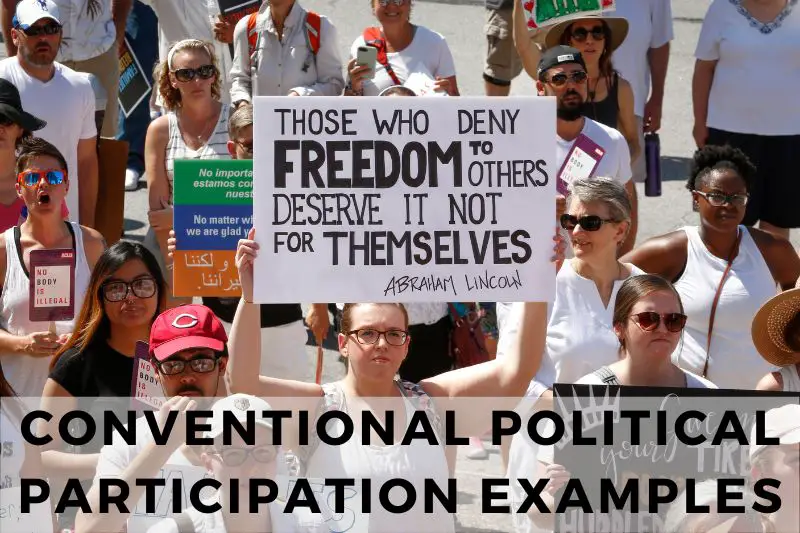
Conventional political participation refers to the traditional ways in which citizens engage with the political process. These activities are integral to democratic systems and provide individuals with the opportunity to influence governance, policies, and leadership. By participating in conventional political activities, people help shape the direction of their communities, states, and nations. This article explores various forms of conventional political participation, offering insight into how these actions foster civic engagement and contribute to the functioning of a democracy.
Understanding Conventional Political Participation
Conventional political participation encompasses activities that are widely accepted and institutionalized within a political system. These actions are typically legal, formal, and often encouraged or regulated by the government. Unlike unconventional participation, such as protests or civil disobedience, conventional participation is considered a standard way for individuals to express their political beliefs, make their voices heard, and influence decision-making processes. It helps bridge the gap between citizens and their elected officials, ensuring that people’s interests are represented in public policies. Whether it’s casting a vote or volunteering for a campaign, conventional political participation is vital for the healthy functioning of any democracy.
10 Examples of Conventional Political Participation
#1. Voting
Voting is the most fundamental form of political participation in a democracy. It allows citizens to choose their representatives and express their preferences on key issues, shaping the policies and direction of the government. Through voting, individuals directly influence the outcome of elections at local, state, and national levels. It serves as a powerful tool for ensuring that the government remains accountable to the people.
#2. Running for Public Office
Running for public office gives individuals the chance to directly influence policy by occupying a leadership role. Candidates who seek public office engage in a democratic process, where they propose solutions to societal issues, represent the interests of their constituents, and make critical decisions on laws and regulations. This form of political participation requires a deep commitment to public service and often involves extensive campaigning and fundraising.
#3. Joining Political Parties
Joining a political party is a significant way to engage in conventional political participation. Political parties are the primary vehicles through which individuals align with specific ideologies and participate in the electoral process. Members contribute to shaping party platforms, participate in grassroots efforts, and support candidates that reflect their values. This form of participation allows people to work collectively toward political goals and influence party policies.
#4. Attending Public Meetings
Attending public meetings, such as town halls or city council sessions, offers citizens the opportunity to engage directly with elected officials and community leaders. These meetings provide a platform for individuals to raise concerns, ask questions, and express opinions about local policies. By attending these events, citizens can hold public officials accountable and ensure that community issues are addressed at the governmental level.
#5. Contacting Representatives
Contacting elected representatives is an essential way for citizens to voice their concerns and influence decision-making. Whether through emails, phone calls, or letters, reaching out to lawmakers allows individuals to communicate directly with those who represent them in government. This form of political participation can be highly effective, especially when a large number of constituents express their opinions on a particular issue.
#6. Signing Petitions
Signing petitions is a straightforward yet impactful way for individuals to show support for or opposition to a specific cause or piece of legislation. Petitions allow people to demonstrate collective support for an issue, often encouraging lawmakers to take action. Although petitions themselves are not legally binding, they can serve as a powerful tool for raising awareness and mobilizing public opinion on political matters.
#7. Volunteering for Political Campaigns
Volunteering for political campaigns is another significant form of conventional political participation. Campaign volunteers assist candidates by organizing events, canvassing voters, managing social media accounts, and helping with fundraising efforts. This form of participation allows individuals to support the political process actively, contributing to the success of candidates who align with their values and goals.
#8. Participating in Elections Beyond Voting
Participation in elections extends beyond just voting. Citizens can also get involved by working as election officials, helping to ensure that the voting process is fair, transparent, and accessible to all eligible voters. Volunteering as poll workers or assisting with voter registration efforts strengthens the electoral system and ensures that elections run smoothly and inclusively.
#9. Donating to Political Campaigns or Parties
Donating to political campaigns or parties is a financial form of support that helps candidates run for office and promote their platforms. Contributions from individuals can fund advertising, outreach programs, and other essential campaign activities. Financial donations play a critical role in the political process, enabling candidates to reach voters and advocate for their policies.
#10. Engaging in Advocacy or Lobbying
Advocacy and lobbying are forms of political participation where individuals or groups work to influence public policy and legislative decisions. Advocacy typically involves raising awareness about specific issues, while lobbying involves directly engaging with lawmakers to push for legislative changes. Both forms of participation can be effective in shaping government policies and ensuring that the needs of specific communities are addressed.
Conclusion
Conventional political participation plays a critical role in ensuring that democratic systems function effectively. Through activities such as voting, running for office, attending public meetings, and advocating for issues, citizens contribute to the shaping of policies, the accountability of elected officials, and the overall direction of their communities and nations.
These forms of participation, while often seen as traditional, remain foundational to maintaining the democratic process and ensuring that the voices of the people are heard. By engaging in these conventional forms of participation, individuals uphold their civic duty and contribute to a more vibrant and responsive political system.
